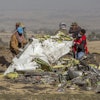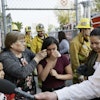NEW ORLEANS (AP) — With a high-stakes trial set to resume in less than a month, BP and the federal government on Thursday offered conflicting estimates of how much oil spilled into the Gulf of Mexico after the blowout of the company's Macondo well triggered a deadly explosion.
In a court filing, BP urges U.S. District Judge Carl Barbier to use an estimate of 2.45 million barrels, or nearly 103 million gallons, in calculating any Clean Water Act fines.
Justice Department experts estimate that around 4.2 million barrels, or approximately 176 million gallons, spilled into the water before BP sealed its well 86 days after the April 20, 2010, blowout.
Both sides agree that 810,000 barrels, or 34 million gallons, escaped the well but was captured before it could pollute the Gulf.
The second phase of a trial designed to determine how much more money London-based BP PLC and its contractors owe for the disaster is scheduled to start on Sept. 30.
The estimates contained in Thursday's briefs mirror figures that BP and the government previously have touted. But the court filings outline the trial testimony and arguments that each side anticipates presenting.
BP said its experts "honor the available data" and use a "proven methodology that does not require simplistic and unverified assumptions about flow conditions."
"In contrast," BP lawyers wrote, "the United States' experts employ unproven methods that require significant assumptions and extrapolations in lieu of, and even directly inconsistent with, the available data and other evidence."
Justice Department lawyers say BP's estimates are based on a flawed theory that the cement in the wellbore and the condition of the blowout preventer — the key safety device that malfunctioned — were "impediments to flow that eroded very slowly."
"How do the Defendants justify such low numbers? By abandoning the data from the (spill) response actions and contradicting evidence" from the trial's first phase, they wrote.
A key expert for BP will be Martin Blunt, a professor of petroleum engineering at Imperial College in London. Blunt has claimed the government overestimated the size of the spill by 26 to 42 percent.
"In assessing the data, Dr. Blunt uses a conservative lens," BP lawyers wrote. "Dr. Blunt accounts for fundamental geological facts and principles of physics acknowledged by United States experts but omitted in their flow calculations."
Under the Clean Water Act, a polluter can be forced to pay a maximum of either $1,100 or $4,300 per barrel of spilled oil. The higher maximum applies if the company is found grossly negligent, as the government argues BP should be. But the penalties can be assessed at amounts lower than those caps.
Barbier has said the second phase will be broken into two parts, lasting a total of 16 days. The first part will explore BP's efforts to stop the flow of oil. The second part, which is expected to feature testimony by a total of 16 experts, is designed to determine how much oil spilled into the Gulf.
The judge heard eight weeks of testimony for the trial's first phase, which was designed to identify the causes of the blowout and assign fault to the companies involved.
Eleven rig workers died in the explosion on the Deepwater Horizon, which BP leased from Transocean Ltd., a Swiss-based drilling company.
Attorneys for Transocean, Houston-based cement contractor Halliburton, Gulf Coast businesses and residents and the Gulf states jointly filed a brief Thursday that alleged BP failed to adequately prepare for a deep-water blowout despite knowing the risks and consequences.
"BP knew from the beginning that it was not prepared to respond to the Macondo blowout and meet its obligations," they wrote. "For decades, it ignored its obligation to prepare."
BP attorneys say they company "dedicated tremendous resources, sparing no expense, to secure the Macondo well."
They wrote: "The challenges to shut in the Macondo well were extraordinary, and so too were BP's efforts in responding."






















